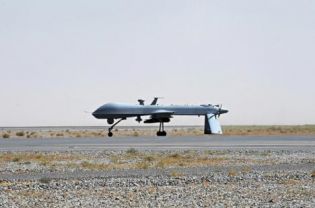Debates are growing over the increasing use of remotely piloted and armed drones, with a new study by the British Defense Ministry questioning whether advances in their capabilities will lead future decision-makers to “resort to war as a policy option far sooner than previously.”
Active and retired US Air Force officers involved in developing drones stress that the aircraft brings in more decision-makers, better targeting data and more accurate delivery systems than fighter jets.
But use of the unmanned aerial vehicles has drawn growing public scrutiny based on their lethal attacks in Pakistan against Al Qaeda, in Afghanistan against the Taliban, in Yemen against Al Qaeda in the Arabian Peninsula, and most recently in Libya, as announced last week by US Defense Secretary Robert M. Gates.
The British study noted that drones were becoming increasingly automated. With minor technical advances, it said, a drone could soon be able to “fire a weapon based solely on its own sensors, or shared information, and without recourse to higher, human authority.” It cautioned that the Defense Ministry “currently has no intention to develop” such systems.
Nonetheless, the aircraft, piloted by people far from the battlefield, represents an approaching technological tipping point “that may well deliver a genuine revolution in military affairs,” according to the Joint Doctrine Note, which was conducted under the direction of the British Chiefs of Staff. Titled “The United Kingdom Approach to Unmanned Aircraft Systems,” it was first disclosed last week by the Guardian newspaper.
The British study said it was essential that military officials not “risk losing our controlling humanity and make war more likely” by using armed drones. It also asserted, however, that the laws of war call on commanders on both sides of the fight to limit loss of life and that “use of unmanned aircraft prevents the potential loss of aircrew lives and is thus in itself morally justified.”
At a Washington conference of the International Institute for Strategic Studies last week, the issue of drones was also discussed.
Lt. Col. Bruce Black, program manager for the Air Force Predator and Reaper aircraft, noted that some 180 people are involved in each drone mission. The result, he said, is that “there is more ethical oversight involved with unmanned air vehicles than with manned aircraft.”
At the same conference, former CIA director Michael V. Hayden described how, with a Predator circling overhead, those involved in ordering use of its missiles from thousands of kilometers away can call up computer maps that show the potential effects of each weapon.
Before any of the Hellfire missiles are launched, he said, the backup team asks for a readout of the impact the missile would have on its ground target. Nothing similar can be done with ground-supporting manned aircraft, he said.
But the drones have become part of the propaganda war where they are used. Without referencing the Taliban or Al Qaeda, the British paper noted that insurgents had cast themselves as the underdog against a bully that was “unwilling to risk his own troops, but is happy to kill remotely.”
Black said that when a Predator operator was connected to a fighter on the ground in Afghanistan, “you can hear his voice.”
Col. Dean Bushey, deputy director of the Air Force Joint Unmanned Aircraft Systems Center, said that the crews that ran Predators went through the exact routines that airplane pilots do prior to a mission.
Will military drones terminate man's role in war
Categories
high tech
About Author
Gistguy.com provides with all the latest celebrity, entertainment gossips and gists from around the world.




0 comments:
Post a Comment